Biological safety is the state of protection of people and individual components of the natural environment (atmospheric air, surface and ground water, the earth’s surface and soil layer, flora and fauna and other organisms from hazardous biological factors, including those ensured by biological protection measures.
This is a system of medical-biological, organizational and engineering measures aimed at protecting working personnel, the population and the environment from the effects of biological agents.
Pathogenic biological agent – microorganisms, poisons of biological and plant origin (toxins), helminths, nematodes, capable of causing an infectious and (or) parasitic process in the body of a human, animal or plant.
Principles of ensuring biological safety
1) handling of pathogenic biological agents exclusively for non-military purposes: handling of pathogenic biological agents for the purposes of developing, producing and stockpiling, using bacteriological (biological) and toxin weapons is prohibited;
2) prevention, analysis and forecast of biological threats based on data from accounting and monitoring in the field of biological safety;
3) controllability of handling of pathogenic biological agents: handling of pathogenic biological agents is carried out in accordance with the requirements in the field of biological safety;
4) preventive measures in the field of biological safety must be proportionate to the degree of danger of biological factors;
5) priority of the national interests of the Republic of Kazakhstan: it is not permitted to accept obligations within the framework of international cooperation that do not correspond to the national interests of the Republic of Kazakhstan, that could damage the national security of the Republic of Kazakhstan or lead to the loss of independence of the Republic of Kazakhstan.
State regulation in the field of biological safety
The main problems and threats, strategic goals, main directions, target indicators, tasks and performance indicators, interdepartmental cooperation in the field of biological safety are determined by the National Security Strategy of the Republic of Kazakhstan.
Ensuring prompt interdepartmental exchange of information and taking coordinated measures in the field of biological safety.
Development in the field of biological safety
JSC National Holding QazBioPharm has developed methodological recommendations and guidelines in the field of biological safety:
1) “Biological safety guidelines for subsidiaries of the Joint Stock Company National Holding QazBioPharm ( when working in laboratory conditions )”;
2) Methodological recommendations:
— “Creation of a system for epidemiological forecasting (modeling) and response to particularly dangerous infections
— “Methodology for assessing economic damage from especially dangerous infections endemic to Kazakhstan, the effectiveness of preventive and anti-epidemic measures”
— “Creation of a response and forecasting system for emerging infections”
— “Methodology for assessing biological risks”
— “Methodology for the formation and updating of regional Biological Risk Passports of epidemically significant natural focal infections of the Republic of Kazakhstan (CCHF, HFRS, tularemia, anthrax, plague)
| 1) “Biological safety guidelines for subsidiaries of the Joint Stock Company National Holding QazBioPharm (when working in laboratory conditions)”, approved by Order No. 94-Ө dated 08.10.2024.The Guide contains principles and measures to prevent errors and incidents when working with biological materials and covers the main issues of biosafety in laboratories, as well as such biological processes as collection, transportation, storage of samples and materials. | 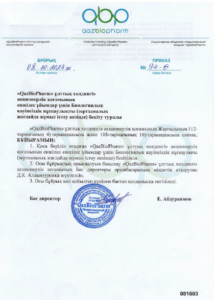 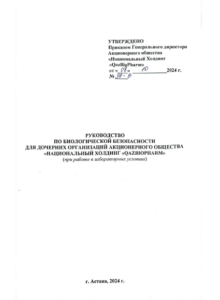 |
| 2) Methodological recommendations “Creation of a system of epidemiological forecasting (modeling) and response to especially dangerous infections (approved by the National Scientific Center for Health Development named after S. Kairbekova of the Ministry of Health of the Republic of Kazakhstan, meeting minutes No. 491 dated September 30, 2024). ISBN 978-601-305-625-8The methodological recommendations describe the creation of a system for epidemiological forecasting and response to particularly dangerous infections.
The methodological recommendations will be useful for specialists in the field of epidemiology, medicine and public health, employees of medical organizations and authorized bodies responsible for ensuring the sanitary and epidemiological well-being of the population, as well as for the implementation of measures to prevent the spread of especially dangerous infections and ensure biological safety. |
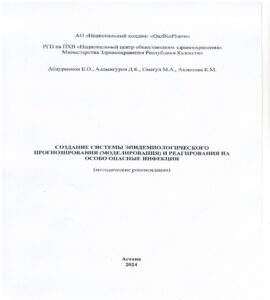 |
| 3) Methodological recommendations “Methodology for assessing economic damage from especially dangerous infections endemic to Kazakhstan, the effectiveness of preventive and anti-epidemic measures” (approved by the National Scientific Center for Health Development named after S. Kairbekova of the Ministry of Health of the Republic of Kazakhstan, meeting minutes No. 490 dated September 30, 2024). ISBN 978-601-305-626-5The methodological recommendations present a methodology for assessing economic damage from particularly dangerous infections and the effectiveness of preventive and anti-epidemic measures.
The methodological recommendations are a practical guide for heads of healthcare organizations, researchers, specialists in the field of sanitary and epidemiological well-being of the population, and veterinary services. |
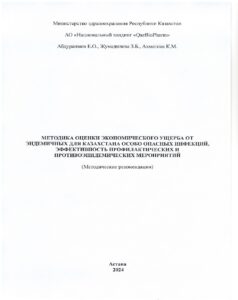 |
| 4) Methodological recommendations “Creation of a response and forecasting system for emerging infections” (approved by the National Scientific Center for Health Development named after S. Kairbekova of the Ministry of Health of the Republic of Kazakhstan, meeting minutes No. 508 dated November 29, 2024). ISBN 978-601-305-630-2The guidelines have been developed as material for use by medical workers in the treatment and prevention service, laboratory specialists, and epidemiologists in responding to and predicting emerging infections.
The guidelines address issues of a coordinated response system to outbreaks of emerging infections, the actions of various response services, and their forecasting. |
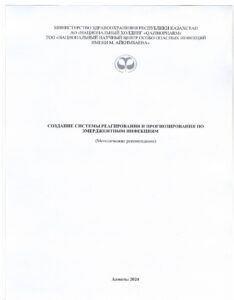 |
| 5) Methodological recommendations “Methodology for assessing biological risks” (approved by the National Scientific Center for Health Development named after S. Kairbekova of the Ministry of Health of the Republic of Kazakhstan, meeting minutes No. 460 dated May 30, 2024). ISBN 978-601-305-623-4The methodological recommendations provide a description of pathogenic biological agents, methods for the indication/detection and identification of pathogenic biological agents, the concept of “biological risk”, and information on its etiological and driving factors.
The methodology provides for the assessment of the main elements and auxiliary factors of the current biological threat. |
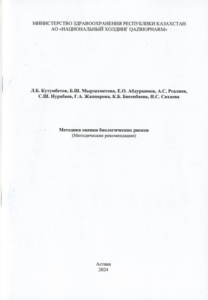 |
| 6) Methodological recommendations “Methodology for the formation and updating of regional Biological Risk Passports of epidemically significant natural focal infections of the Republic of Kazakhstan (CCHF, HFRS, tularemia, anthrax, plague)”(approved by the National Scientific Center for Health Development named after S. Kairbekova of the Ministry of Health of the Republic of Kazakhstan, minutes of meeting No. 480 dated September 19, 2024). ISBN 978-601-305-622-7
The methodological recommendations are offered as an exclusive working tool for epidemiologists of regions and districts of the Republic of Kazakhstan for the purpose of independent (at the level of regions and districts) indicative assessment of biological risks for current, endemic natural foci of particularly dangerous infections. |
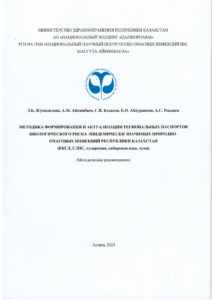 |